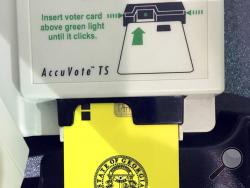ATLANTA (AP) — If Georgia election officials fail to meet the tight timeline they've set to implement an entirely new voting system, they'll have to quickly pivot to hand-marked paper ballots for the March presidential primaries.
That's according to a Thursday ruling by U.S. District Judge Amy Totenberg.
Georgia Secretary of State Brad Raffensperger last week certified a new voting system and said it will be in place by the March 24 presidential primary elections, just over seven months away. The chief information officer for Raffensperger's office, Meritt Beaver, acknowledged during a court hearing last month that the implementation schedule is "tight."
The state's $106 million contract with Denver-based Dominion Voting Systems includes new touchscreen voting machines that print a paper record with a code that's read by a scanner.
Raffensperger said in an emailed statement Thursday that his office is "already moving full steam ahead" to implement the new system.
It's set to replace the outdated election management system and paperless voting machines that Georgia has used since 2002. Election integrity advocates and individual voters sued in 2017 alleging that the touchscreen voting are unsecure and vulnerable to hacking.
They had asked Totenberg to order an immediate switch to hand-marked paper ballots, noting that special and municipal elections are scheduled before March. The judge declined, citing concerns about the state's capacity to make an interim switch to hand-marked paper ballots while also working to implement a new system.
But she made it clear it's not acceptable for the state to use the old system as a backup if the new system isn't in place in time.
"Georgia's current voting equipment, software, election and voter databases, are antiquated, seriously flawed, and vulnerable to failure, breach, contamination, and attack," she wrote.
Instead, she ordered election officials to develop a contingency plan that includes using hand-marked paper ballots. She ordered a pilot of that contingency plan during elections this November.
Totenberg noted that some dates and details about the implementation have been a "moving target," and that the state has already scaled back a planned pilot program and postponed some deadlines.
This "slippage" gave her concerns about the state's ability to effectively handle the "mammoth undertaking" of procuring, testing and installing the equipment in all 159 counties, as well as installing a new election management, ballot building and voter registration system, she wrote.
Jennifer Doran, elections supervisor for Morgan County, said she's pretty confident the state will meet the deadlines, but she said, "It's better to have a contingency already in place in case it doesn't happen."
Totenberg's ruling applies only to Georgia, but at least parts of eight other states still use paperless balloting. Using voter registration and turnout data, the Brennan Center for Justice at NYU School of Law estimated in a report this week that as many as 12% of voters, or around 16 million people in the U.S., will vote on paperless equipment in November 2020.
The plaintiffs in this lawsuit have said the new machines have many of the same vulnerabilities as the old ones. They also worry that the portion of the printed record that's read by the scanner is a QR code, not human-readable text, meaning voters have to trust that the code accurately reflects their selections.
Totenberg called the legislation providing for a new system "an essential step forward out of the quagmire, even if just to terminate use of an antiquated vulnerable voting system."
"The wisdom or legal conformity of the Secretary of State's selection of a new vendor's particular ballot system though is not the question now before the Court," she wrote, adding in a footnote that a report last year from the National Academies of Sciences, Engineering, and Medicine recommends the use of paper ballots because of the vulnerabilities of electronic systems.
Perhaps alluding to legal challenges of the new system promised by plaintiffs, Totenberg quoted baseball legend Yogi Berra, writing: "The past may here be prologue anew — it may be 'like deja vu all over again.'"
The state, she wrote, has "previously minimized, erased, or dodged the issues underlying this case." In her 153-page order, Totenberg recounted the history of the case and related actions, or inaction, by the state "to ensure transparency for the future."
Both sides saw victory in Totenberg's order.
"(W)e are pleased the Court endorsed the policy decisions of the state's elected officials to move to a new paper ballot voting system in time for the 2020 elections while not disrupting the 2019 elections," Raffensperger said in an emailed statement. "These activist plaintiffs continue fruitlessly attempting to force their preferred policy outcomes on Georgia voters without success."
Marilyn Marks, executive director of the Coalition for Good Governance, one of the plaintiffs in the case, wrote in an email that it was important that Totenberg "recognized Plaintiffs concerns about the State's plan to move to another form of electronic voting — electronic ballot marking devices." The voters' right to accountable elections requires hand-marked paper ballots counted by optical scanners with thorough audits, she wrote.
David Cross, a lawyer representing several Georgia voters in the case, called the ruling a "big win for all Georgia voters and those working across the country to secure elections and protect the right to vote."
The integrity of Georgia's voting system was heavily scrutinized during last year's midterm election, in which Republican Brian Kemp, the state's top election official at the time, narrowly defeated Democrat Stacey Abrams to become governor.
Totenberg also ordered state officials to develop a plan by Jan. 3 to address errors and discrepancies in the state's voter registration database. Election officials are also instructed to provide each precinct with a paper backup of its voter registration list.

